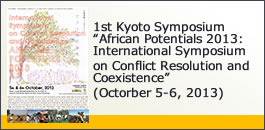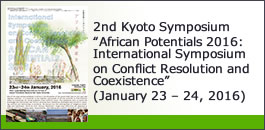Date: Octorber 5-6, 2013
Venue: Large meeting room (333) on 3rd floor of Inamori Foundation Memorial Hall, Kyoto University
Admission: free
Outline
One of the most serious problems in Africa is the disruption of the social order due to civil wars and regional conflicts. It is essential to the stability and growth of African societies to find effective means to ameliorate the varied problems these conflicts cause. This symposium aims to clarify the knowledge and institutions that African societies have themselves developed and utilized in resolving conflicts and maintaining co-existence. We discuss how this existing body of indigenous knowledge and institutions —which we term “African Potentials”— might most effectively be employed in settling conflicts, bringing about reconciliation, and healing post-conflict societies in Africa today.
Summary of Discussion
1. An Overview
Total number of presentations: 16 papers (No. 1-16), 1 keynote speech, and 13 poster presentations (P1-13). There were a variety of diversified topics
- 1) Civil wars: Sierra Leone (1), Uganda (4, P-11), Mozambique (15), South Sudan (P-5, P-6). However, they do not deal with civil wars per se, but with their consequences and impacts.
- 2) Armed conflict: Among pastoralists in Northern Kenya (5) and South Sudan (P-6); between villages in Cameroon (P-12).
- 3) Non-armed conflict: Moshi cooperatives (6), “Green Revolution” (7) and Kilombero Valley Basin (10) in Tanzania; Arsii (9) in Ethiopia; wildlife conservation – local people (11, 12) in Kenya & Ethiopia; Hausa – Fulbe/Tuareg (8) in Niger. Non-armed conflicts do not necessarily mean that they are not violent. On the contrary, often they force people to behave in a certain way against their will, which may relocate and uproot them, or create new conditions that make their traditional ways of livelihood difficult.
- 4) South Africa (2, 3, P-4, P-8).
How do we classify the violent situation under Apartheid and post-Apartheid regimes?
- 1) State (government) vs. armed groups,
- 2) State (government) vs. local communities/ethnic groups,
- 3) Between local communities/ethnic groups: Bamileke and others (16) in Cameroon; “Basotho” and “Batwana” in South Africa (P-8), Manjo and Kafa (P-10) in Ethiopia,Agriculturalists vs. pastoralists/agro-pastoralists: New migrants vs. autochthonous people (16, P-2)
- 4) Within civil society / community / ethnic group: Arsii (9) in Ethiopia, Igembe-Ameru (14) in Kenya, Bamileke (16) in Cameroon,
- 5) Global regimes (environmental, developmental, humanitarian & human rights) vs. local communities/ethnic communities: P-7,
- 6) Global regimes vs. state (government),
- 7) Class struggles?: CIDs in Johannesburg (P-4),
- 8) Between the dead and the living (P-11).
It is not easy to draw clear dividing lines among them. They are intermingled. A seemingly very local conflict does have a national/regional/international/global aspect. It may be the key nature of conflicts that we are dealing with.
The below Arsi saying quoted by Dr. Mamo Hebo seems to be very revealing.
A human being is a human being because of other human beings.
A massacre, ethnic-cleansing or genocide may only occur when some people of a certain category becomes “dehumanized” or demonized. They are no longer considered fellow human beings to live together. … When and how this can happen?
2. What is “African potentials”?
The below is a result of group discussion during lunch break by Ohta, Matsuda, Takahashi, Shigeta and Kurimoto.
- 1) Whose potentials? Who are to identify and utilize them? It should not be something only to be discovered by outsiders, scholars and experts.
- 2) Compatibility of economic development and conflict resolution and co-existence. In other words, economic growth should be achieved in a way that it would not create development induced conflict (Session 2).
- 3) Natural resources vs. livelihood. No doubt that competition for resources is a root cause of conflict. It is inevitable, multi-layered and complex (Session 3).
- 4) The issue of justice/injustice, social and economic, remains to be answered. Here it suffices to note the importance of existing gap in the conceptualization of justice between various stakeholders (cf. Ogada’s paper).
3. For clarification of the notion of “African Potentials”:
- 1) A simple dichotomy, i.e., modern/traditional, universal/particular, or Western/African, which is often helpful to clarify the analysis, may not work effectively when we consider “African Potentials”.
- 2) What we observe or what is happening on the ground is much more complex and intrigued than one might expect. It is not static but dynamic. For instance, no one can take it for granted what is being “traditional,” “customary,” “tribal,” “ethnic,” or “communal.” It is not given, but it is a process and situational, always being contested and negotiated among themselves and with other stakeholders. That is why the notion of positionings (cf. Hodgson, Session 3) is essential.
- 3) In the same line of argument we may not take it for granted what is government or governmental. Although the structure of government is universal, its actual working may be different.
- 4) A variety of stakeholders are not only multi-layered but intermingled. They shift positioning according to situations. The social/political/cultural group/institution that a stakeholder claims to belong may be subject to shifting.
- 5) The dynamic, flexible, shifting, contested and negotiated nature is the essence of “African Potentials” that we need to explore.
- 6) Because of the above mentioned nature “African Potentials” can be manipulated and abused by a stakeholder for personal or group benefit at the expense of others. This aspect also needs to be explored.
Program
Sat. Oct. 5, 2013
- 9:20 – 9:30 Itaru Ohta (Kyoto University) Opening Address
9:30 – 10:45 Frederick Cooper (New York University) Keynote Speech: Decolonization and the Quest for Social Justice in Africa - 11:00 – 12:00 Poster Presentations Core Time
◎Session 1. Revisiting Transitional Justice
- 13:30 – 16:00
- – John Caulker (Fambul Tok) The Role of Community Owned and Led Reconciliation Processes in Post War Sierra Leone
- – Zenzile Khoisan (First Nation News) Transitional Justice under Pressure: South Africa’s Challenge
- – Toshihiro Abe (Otani University) Is Transitional Justice a Potential Failure? Understanding Transitional Justice Based on its Uniqueness
- – Tamara Enomoto (University of Tokyo) Governing the Vulnerable Self at Home and Abroad: Peace and Justice in Northern Uganda and “KONY 2012”
- Comment: Kyoko Cross (Kobe University)
Chairperson: Shinichi Takeuchi (Institute of Developing Economies)
◎Session 2. Beyond Conflicts in Africa: How to Understand Nexus between Social Relations, Resource Scarcity and Economic Development
- 16:20 – 18:50
- – Othieno Nyanjom (Kenya Institute for Public Policy Research and Analysis (KIPPRA)) Understanding Pastoralism in Northern Kenya: The Imperative for Socio-economic Transformation
- – David Gongwe Mhando et al. (Sokoine University of Agriculture) & Juichi Itani (Kyoto University) Why Some Primary Societies in Moshi, Tanzania Sell Coffee Independently from the Kilimanjaro Native Cooperatives Unions’ Cartel?
- – Shuichi Oyama (Kyoto University) Farmer-Herder Conflicts and Conflict Prevention in Sahel Region of West Africa
- – Yuko Nakano et al. (University of Tsukuba) & Kei Kajisa (Aoyama Gakuin University) The Determinants of Technology Adoption: A Case of Rice Sector in Tanzania
- Comment: Jun Ikeno (Kyoto University), Takahiro Fukunishi (Institute of Developing Economies)
Chairperson: Motoki Takahashi (Kobe University)
Sun 6th October, 2013
◎Session 3. Whose Potential Can Contribute toward the Process of Conflict Resolution over Natural and Livelihood Resources?
- 9:30 – 12:00
- – Mamo Hebo Wabe (Addis Ababa University) Mutual-Avoidance as a Mode of Handling Dispute in Everyday Life: Cases from Arsii Oromo Villages, Southern Ethiopia
- – Stephen Nindi et al.(Tanzania Wildlife Research Institute) Conflicts over Land and Water Resources in the Kilombero Valley Basin, Tanzania
- – Nobuko Nishizaki (Fukushima University) Contribution of Local Praxis to Conflict Resolution over Conservation Issues: Lessons from the Management of Conservation Areas in Ethiopia
- – Toshio Meguro (JSPS Research Fellow/University of Tokyo) Potential of Changing Attitudes and Representation for Resolving Multilayered Conflicts over Wildlife
- Comment: Gen Yamakoshi (Kyoto University)
Chairperson: Masayoshi Shigeta (Kyoto University)
◎Session 4. Local Wisdoms and the Globalized Justice in a Process of Conflict Resolution
- 14:00 – 16:30
- – Mikewa Ogada (Centre for Human Rights and Policy Studies) Reframing Our Understanding of the Production of “African Potentials” for Conflict Resolution: Lessons from the Fragmented Localization of the Discourse of International Criminal Justice in Kenya
- – Shin-ichiro Ishida (Tokyo Metropolitan University) Egalitarian Conflict Management among the Îgembe of Kenya
- – Euclides Gonçalves (Eduardo Mondlane University/Centro de Estudos Sociais Aquino de Bragança) The Colours of Justice: Village Chiefs, Secretaries and Community Leaders in Conflict Resolution in Northern Mozambique
- – Misa Hirano-Nomoto (Kyoto University) The Potential to Deter Conflict in Urban Africa: The Case of the Bamileke of Yaoundé, Cameroon
- Comment: Rumi Umino (Tokyo Metropolitan University)
Chairperson: Motoji Matsuda (Kyoto University)
Poster Presentation
- Midori Daimon (Kyoto University) Performers Pick up the Gauntlet: The Tense Relations between People and Performers of Entertainment ‘Karioki’ in Kampala, Uganda
- Masaya Hara (Kyoto University/JSPS Research Fellow) Social Ties and Food Exchanges in a Multi-ethnic Agricultural Community in Northwestern Zambia
- Hitomi Kirikoshi (Kyoto University) Tree Management and Sharing Customs of Famine Food in Hausa Society of Sahel Region, West Africa
- Yohei Miyauchi (Rikkyo University) The Powers of Neoliberal Communities: The Pursuit of Safe Living Environments in Post-apartheid Johannesburg
- Yuko Tobinai (Sophia University) How Did People Become “True” Christians?: The Kuku’s Migration and the Christian Revival Movement in Greater Sudan
- Eri Hashimoto (Hitotsubashi University) Prophets, Prophecies, and Inter-communal Conflicts in Post-independence South Sudan
- Naoaki Izumi (Kyoto University) Labor Force of Large-scale Farmer with Capitalist Mode in Agro-pastoral Society, Tanzania: Focusing on Economic Relationship between Two Ethnic Groups
- Sayaka Kono (Tsuda College) A Study of Local Protest within the Framework of ‘Divide and Rule’ in Apartheid South Africa: Being ‘Basotho’ to Protest ‘Ethnic Antagonism’
- Noriko Narisawa (Kyoto University) Gift-giving for Developing Personal Friendships among Women in Rural Zambia: A Case Study on the Burgeoning Ceremony called Cilongwe
- Sayuri Yoshida (JSPS Research Fellow/Osaka Prefecture University) Social Discrimination and Minority Rights Petitions by the Manjo in the Kafa and Sheka Zones of Southwest Ethiopia
- Hiroko Kawaguchi (Kyoto University/JSPS Research Fellow) Interpretation of Death and Coping with the Dead among Post-Conflict Acholi in Northern Uganda
- Co-organized by
– The Grant in Aid for Scientific Research (S) Project: Conflict Resolution and Coexistence through Reassessment and Utilization of “African Potentials”
– The Center for African Area Studies, Kyoto University
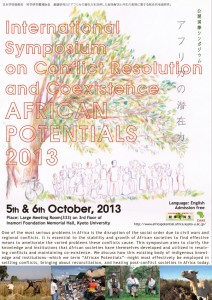

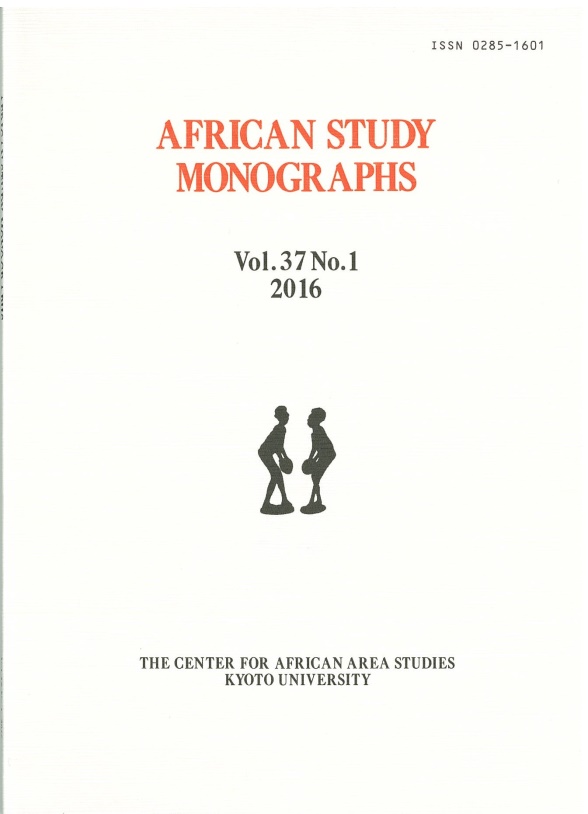
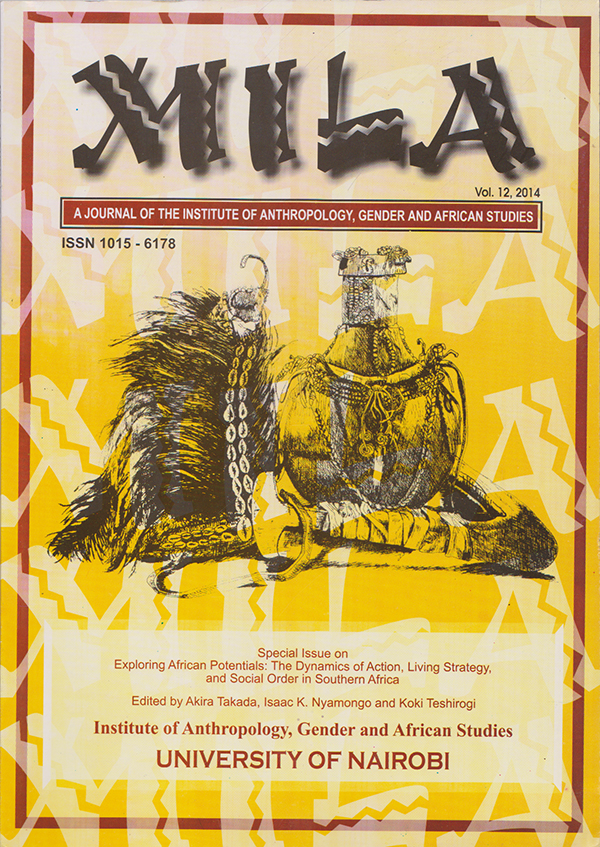 Exploring African Potentials, Mila Special Issue
Exploring African Potentials, Mila Special Issue